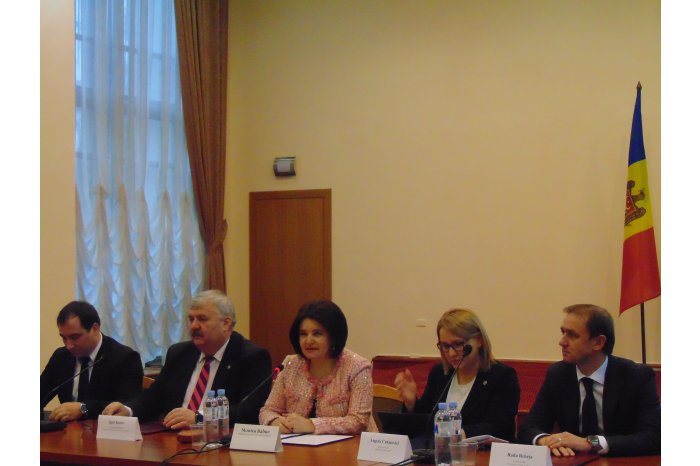Moldovan education, culture and research ministry presents report on work carried out in 2018
16:22 | 28.12.2018 Category: Social
Chisinau, 28 December /MOLDPRES/ - The Education, Culture and Research Ministry today presented the report on the work carried out in 2018 at a news conference.
Minister Monica Babuc said that, on this period, the gross monthly average salary in the education sector had increased by 40 per cent against 2015. Thus, once the new wage payment system enforced in the public sector, the gross average salary for teachers will reach 6,588 lei, up by 71.5 per cent against 2015.
At the same time, Monica Babuc noted that the allowances had been increased for young specialists employed through distribution in education institutions, from 30,000 lei to 120,000 lei for graduates of higher education institutions and from 24,000 lei to 96,000 lei for graduates of the post-secondary vocational schools. Also, decision-makers established a financial compensation worth 2,000 lei for about 50,000 teachers from the general education, with the allocation of more than 98 million lei, and the didactic norm was reduced to 75 per cent for young teachers, with the preservation of the office salary.
According to the official, 2,500 teachers are absent in the education system; many pre-university institutions are not connected to water supply and sewerage networks and there are no sanitary units in some schools. To cover the necessary number of teachers for all disciplines according to the school curriculum, decision-makers allocated four million lei for the re-qualification of 420 teachers and re-established the pedagogical education in colleges.
„More than 900 kindergartens were renovated with the support of Romania’s government, which accounts for about 60 per cent out of those 1,485 institutions from Moldova. The value of investments stood at 26 million euros. As many as 196 buses were purchased with Romania’s assistance, with the investment’s cost being of 101.4 million lei and 12,500 pupils benefit from this transport. At the same time, the works of restoration of two centres of excellence in the informatics and light industry sectors were completed and the works are under way at another ten centres of excellence from the energy, electronics, constructions, transport, services and food processing sectors,” Monica Babuc said.
In 2018, the national public budget for education amounted to 10 billion 433 million lei, increasing by 123 per cent against 2015.
At the same news conference, the minister and state secretaries unveiled the main results achieved by the ministry in other fields as well: research and innovation, culture, youth and sport.
The priorities for 2019 were made public at the event too. Among the priorities for the next year in the education sector, there are the development of the school disciplines’ curriculum at the stages of gymnasium and lyceum, implementation of the instruction on the management of home works in the primary, gymnasium and lyceum education, re-conceptualization of the continuous training, etc.
At the same time, as for the research and innovation dimension, the ministry is expected to approve and implement the National Programme on Research and Development for 2019-2022, implement the National Roadmap for integration in the European Research Area for 2019-2021, and as for the culture dimension, it is about the reorganization of theatre institutions and establishing a new mechanism of their financing, launch of a national programme on reviving community centres in Moldova, starting the second stage of restoration of the Organ Hall’s building, final stage of construction of the building of the B.P. Hasdeu Musical and Dramatic Theatre from Cahul, restoration of the building of the Moldova’s National Art Museum and Assumption of the Mother of God Church from the Causeni town, etc.
As for the segment of youth and sport, the ministry plans to implement the National Strategy of Youth Sector Development 2020 and an action plan on its carrying out, ensuring the implementation of the annual programme of grants for youth organizations, creation and improvement of the technical and material basis of sports schools and centres, getting an as large as possible number of quotas of qualification for the Olympic Games due in Tokyo in 2020, revival of republican Spartakiads for pupils from gymnasiums, colleges and lyceums, etc.

